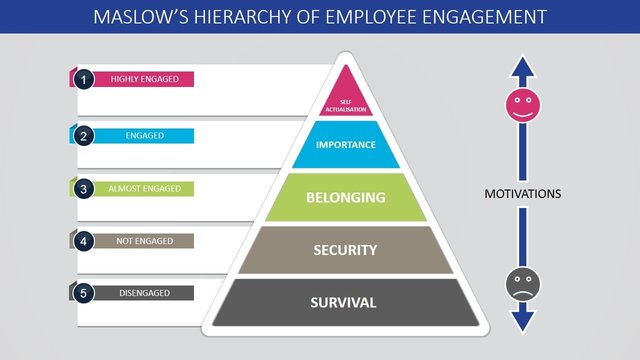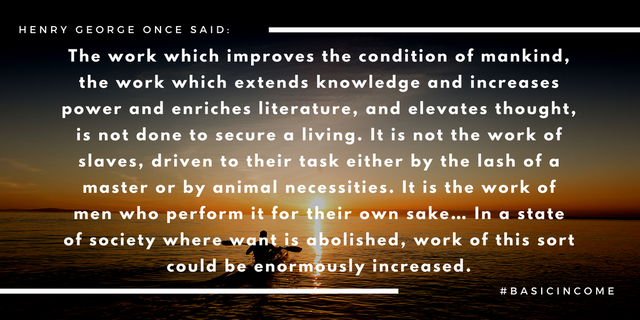The Monsters, Inc. Argument for Unconditional Basic Income: How to convert an economy based on fear to one based on joy
Every year since 2002, there is a North American Basic Income Guarantee Congress held in either the US or Canada. On the eve of this year’s NABIG in Hamilton, Ontario, I’d like to share with you my favorite presentation from 2017. It was a talk given by Ken Burak and it centered around the Pixar film “Monsters, Inc” as an argument for basic income. It may be a kids movie, but it has a lesson to teach that's far deeper than you may think. In this post, I’ll summarize it for you.
Monsters, Inc. takes place in a universe that literally runs on fear. Monsters enter the human world at night through bedroom closets to scare children for the purpose of energy production. You see, whereas the world we know mostly runs on fossil fuels, hydropower, nuclear, and increasingly solar and wind, the world of monsters runs on the emotion of fear. When kids scream, their screams are harvested as energy. That energy powers a world of monsters. And so every night, monsters enter the world of humans, to make children scream, to mine their fear.

However, all of that changes when through the course of the film, it’s accidentally discovered that the laughter of children is ten times more powerful than their screams. This discovery leads at the end of the film to a complete transformation of the company Monsters, Inc. as it pivots from fear-based energy production to joy-based energy production.
Think about that for a second. An entire world was oriented around the harvesting of screams. Every single day, monsters went to work with the purpose of scaring children as their goal. The entire global monster economy was built around this as its foundation. This was normal. This was life.
As the viewer, we can only imagine that at some point in the past, some monster—who must have gone down in monster history—scared a child and upon doing so discovered that the resulting screams could function as a power source. It worked, and yet laughter, which worked ten times better, was never even considered. It was never even tested. No one thought to try laughter, because screams worked, and so screams were what the economy was built upon.
Believe it or not, we live in that same kind of world. We discovered something monstrous that works, and we use it to drive our economy. We’ve done it for so long, we don’t even question it, and we never even tested a far more powerful alternative. What works we discovered is an economy based on the fear of death by poverty, where fear of death is used to compel people into working, and what we never tested (until recently that is) is an economy where there is no fear of death by poverty, where all work is thus fully voluntary.
Monsters, Inc. can therefore be seen as a metaphor for wage slavery.
Yes, forcing someone to work results in work getting done. We learned that a long time ago. We learned that whipping someone could get them to pick cotton. We learned that paying zero dollars in wages meant a hefty profit thanks to low overhead. If we force someone to work, and pay them nothing, then we get to keep everything. What a great idea, right? Well, no, it’s a terrible idea, and it’s morally wrong, even if it works.
Now some people are under the impression we got past this idea, but we didn’t. We didn’t abolish slavery as an institution. We simply went from one form of slavery (chattel slavery), to another form of slavery (wage slavery). Instead of forcing people to work for nothing, we instead let people work for money needed to live, without which they risk death for not obtaining. Force is involved in both, albeit in different forms.
This is also an understanding even freed slaves had directly following the Civil War. When asked about slavery, and how to preserve freedom from it, Garrison Frazier, a newly free man chosen by fellow former slaves to speak for them, responded: “Slavery is, receiving by irresistible power the work of another man, and not by his consent. The freedom, as I understand it, promised by the proclamation, is taking us from under the yoke of bondage, and placing us where we could reap the fruit of our own labor, take care of ourselves and assist the Government in maintaining our freedom." Garrison went on to say that "the way we can best take care of ourselves is to have land, and turn it and till it by our own labor.”
Garrison understood that a lack of chains wasn't enough. What was needed to truly end slavery was the ability to resist the irresistible power of another man, by making it resistible through sufficient access to resources to live by one's own hand. Liberty requires non-domination. No action is truly voluntary without the power to refuse that action. Full consent requires the power to say "No" without fatal consequences.
Think of it this way. One method of forcing someone to do something is to physically choke them. If they do what you want, you stop choking them. If they don’t do what you want, you keep choking them until they do. The other method involves gaining control over all the air, and then telling people that if they do what you want, you’ll give them pieces of paper that they can use to pay for air. If they don’t do what you want, you don’t give them any access to air until they do. Both involve the restricting of air supplies. Both are based on the fear of death by asphyxiation. Both involve choices where the choice is life or death, which isn’t really a choice at all. Both are forms of domination, but one is direct, and the other is indirect.
Our entire world is based on this indirect choice of life or death, save for those fortunate enough to be born into a family with sufficient wealth to be the ones providing that choice to others.
Some may disagree with this argument by saying work has always been required to avoid death, and yes, that's true, but for most of human history everything was free, and we could stay alive by just doing some gathering on the land owned by no one. It was only somewhat recently in human history when we privatized everything as property, thus removing the option of free gathering, and replaced it with the option of selling your time to those who up and claimed the land as theirs. The old choice was open your mouth and toss in a free nut or die. The new choice is work for someone else your entire life or die.
It is this choice that underlies everything we do. It is what our entire economy is based on. It is the fear that drives us all. In offices all over the world, and in restaurants and warehouses and factories and governments, everywhere there's people working for money to live, in the minds of those doing the work only for the money, you will find the harvesting of billions of silent screams. We are monsters using fear as a motivator to build our phones and make our cheeseburgers.

And yet, we know people forced to work do not do the best work. We know that people choosing to do work, not for the money alone, or even for money at all, but because the work itself provides meaning in the doing, that work is our best work.
Imagine walking into a restaurant where there are two cooks you can choose between to prepare your meal. One of them is there because to them cooking is an art form. Each dish is a new challenge to best their previous dish. Their life is dedicated to the pursuit of creating the perfect meal. They enjoy this pursuit of perfection so much, that they don’t even accept payment. They wish only to witness the expressions of those experiencing true bliss as they eat their newest creation. If they could bring you to orgasm with their food, they too would experience just as true a state of bliss.

The other cook has a loaded gun being held to their head by an executioner. They have no interest whatsoever in cooking, but they really don’t want to die, and so they will certainly cook for you.
Moral questions aside of putting a gun to someone’s head to force them to cook for you with the threat of death, who do you think will make the better meal? Whose meal would you be happier eating?
Let us make no illusions here. The cook who takes joy in cooking is going to cook a meal ten times better than the cook who cooks out of fear. This is the difference between screams and laughter. This is the difference between a world based on fear and one based on joy.
So how do we create a world based on joy instead of fear? The answer is through unconditional basic income. By unconditionally providing everyone a sufficient amount of money to live regardless of any work done, working then becomes entirely optional. That does not then mean everyone stops working. It means that the work people do switches from being involuntary to being voluntary. It means that the motivation for work shifts from being extrinsic to intrinsic in nature.
This is essentially Maslow’s theory applied to the labor market. With your most basic needs met, you then move on to your higher needs. Everyone is always trying to meet all of their needs, not just their basic needs, so the meeting of basic needs as a starting point simply starts everyone higher up Maslow’s pyramid.

Without basic income, workers in restaurants all over are making your sandwiches with a gun to their head. With basic income, the people making your sandwiches will be only those people who want to make your sandwiches. The work people do would go from being the work people feel they have no choice to do, to the work people are choosing to do more than anything else, because they have the very real freedom to not do anything at all.
Try to think about how profoundly transformative that would be. Right now, only 15% of workers are engaged by the work they do. What if 100% of workers were engaged by their work, because everyone was fully choosing to do it instead of being compelled to do it?
We can create a world that runs on joy instead of fear. We can choose to do that. We can choose to remove the guns pointed at everyone’s heads, and in so doing liberate everyone with the freedom to voluntarily pursue whatever pursuits they find most meaningful. All that’s required is to abolish the fear of death by poverty. Unconditional basic income does that.
And if we don't do that, if we don't transition from fear to joy, we’re nothing short of monstrous.



Universal basic income is just socialism/communism repackaged. More dystopian results wrapped in a thin viral shell of utopianism. The Earth is littered with the remains of the bodies of hundreds of millions of dead resulting from the repeated attempts at Communism, yet people keep saying "oh that wasn't real communism, lets try it again". Please read my article on why universal basic income is a dangerous idea destined to fail: https://steemit.com/politics/@ericarthurblair/universal-basic-income-slavery
Sorry, but Alaska is not an example of communism, and Milton Friedman and Friedrich Hayek did not go down in history as free market communists. You show a poor understanding of what UBI is and what it has the potential to replace, and I suggest doing more reading about how important UBI is to capitalism not destroying itself.
http://www.scottsantens.com/if-you-think-basic-income-is-free-money-or-socialism-think-again
No, Alaska is an example of a state with lots of natural resources and a small population. What happens when the resources run out or the price drops? Oops, I guess we now have thousands of dependent people with no survival or work skills. See Venezuela.
Milton Friedman DID NOT support UBI, that is a complete manipulation of his words. Friedman supported "negative income tax" which is a very different thing, and he even makes the specific distinction between the two in the interview below. Even if he did support it, Milton Friedman is not my God, and I don't have to agree with everything he advocated.
I know exactly what UBI is, and what you theoretically THINK it will fix. Your arguments are ideological and rely almost exclusively on rhetoric. I could write an entire paper breaking down the arguments you make in that article and show why they have no basis and are completely manipulative.
Anything even resembling economics or science is done on such a small scale to be totally irrelevant to a real world roll out of UBI in a large industrialized nation such as the USA. Even the tiny nation of Finland showed mixed results at best experimenting with implementing UBI. You can do 10,000 tiny studies and it is still not evidence of what will happen to society on a larger scale once implemented. Try actually reading the article I wrote and refute the points made there.
Wow, you really think you know a lot of things you don't actually know. Okay, so you've never read that Milton Friedman supported UBI. Does that mean he didn't? Or does it mean you just haven't read where he did? Because guess what, he did, and here's what he said when he was specifically asked about UBI:
So now that you know that, how does it impact your thinking? Milton was right. UBI and NIT are indeed two ways of accomplishing the same thing, and if you read the hyperlink above, you'll better understand that.
You also show that you don't understand what's going on in Alaska. What happens when the oil runs out? The dividends keep on going. That's the entire point of setting up the Alaska Permanent Fund in the first place, which is now over $61 billion in size, to transform a non-renewable resource (oil) into a renewable resource (money). The fund is invested in markets, and the dividend it earns is divided among all Alaskan residents.
Oil is also not the only way of going about creating such a fund. There are many resources that can be used. I suggest looking into them. Here's a good paper about it if you're down for reading a paper to learn lots of new things.
You also show you don't even know what's going on in Finland. It showed mixed results? No it didn't. There ARE NO RESULTS, because the experiment is ongoing to the end of the year. There's not even any preliminary data because there's no access to it yet. Results will be known by the end of next year or early 2020.
You don't know what you think you know. You appear to like to make shit up, or to just accept as fact what others have said, without actually looking into it to verify accuracy.
By the way, your article is just as full of shit as the rest of what you've said here. The very first claim you make is that it's a simple law that if you provide people money all prices rise.
Here's just one example for you to chew on. Let's say a village has an egg scarcity, but people like eggs, so the cost is $1 per egg. Then, everyone is provided UBI. According to your "law" of economics, the cost of eggs should rise.
What happens when a bunch of people use their money to buy chickens? Suddenly, the supply of eggs skyrockets. What happens then? The cost of eggs falls of course, because eggs are now abundant instead of scarce.
Oops, there goes your "law of economics."
By the way, UBI is not about expanding the money supply and dropping new money on everyone (although some people do like that idea). The reason it and NIT are alike, is that both are a net transfer from those above a threshold point to those below a threshold point. That's not inflationary. It's moving existing money from one place to another. And although that can still have some effects on prices, there are a lot of variables involved such that some prices would go up, some down, and some wouldn't be affected at all, and all of these effects also vary by time, such that they can be observed for a matter of days or years depending on other factors.
Markets are not static models. They are complex adaptive systems.
First of all that is not a quote of Friedman supporting UBI, that is him comparing them in a way that is selectively taken out of context in a manipulative way. Second, as I explained before Friedman is not God and he doesn't have all the answers EVEN IF HE DID support UBI (which he doesn't). The interview I linked previously shows him comparing UBI with NIT, and why he supports NIT over UBI specifically.
Regarding Alaska, just because a fund is in place to account for minor market oscillations does not mean the money supplying it is infinite. The same goes for any natural resource. There is no such thing as an infinite supply of anything (except maybe ignorance).
Regarding Finland, no official results have not yet been published. However that by no means makes it impossible to observe existing trends and make extrapolations of the success or failure (in this case failure) of the experiment.
By the way "your article is full of shit" is not a refutation of any of the points made there. Let me ask you a question about your simplistic chicken analogy. What then happens to the price of chicken feed? There is always another down chain cost created by inflation. Your premise operates on the illusion that handing out money will magically make more resources available. Furthermore handing out money is destructive to the VITAL price discovery system of which any resource based economy is based off of. Without that there is no accurate way of monitoring scarcity and value of goods, and the systems of production are destructively skewed.
As far as your "net transfer from those above a threshold point to those below a threshold point", that is also known as re-distribution of wealth, and is at the core of Communist ideology, no matter how apolitical you claim UBI to be. These people may be disproportionately wealthy but they are also the people that GENERATE most of the wealth to begin with. At a certain point you keep taking more and more until they no longer have motivations to keep producing at such levels and tax revenue starts falling.
Once again, the problem with wealth redistribution is eventually you run out of other people's money to spend, then the resulting system simply eats itself as has been demonstrated every time in history when such an economic model was attempted on a large scale. Bury it in all the terminology you like, you are still talking about using the state to take from some by force to give to others.
Markets are complex adaptive systems, yes. However resources are not. Resources are quite finite, and you can wave your magic wand over the money all you want and in whatever way, but more money does not equal more resources.
To the contrary, there is no price discovery possible if people don't have money to signal demand for goods and services.
I suggest reading this to get a bit deeper into just how badly markets can be distorted when a large group of participants have no means of participating in the price discovery calculation mechanism.
By the way, you're welcome to read the actual interview with Milton Friedman instead of continuing to pretend you know what he was thinking.
So by your logic if there is no UBI suddenly money ceases to exist completely and we can't have price discovery? You are quite the contrarian. That works good for ideology, not regarding the laws of economics so much. Price discovery does not cease to exist just because certain people don't participate in the market.
The fact that you linked this segment of an article as an argument shows me you nor the author have any understanding of the definition or function of price discovery (or perhaps are willfully perverting it).
Price discovery is the method by which producers are signaled the supply and demand of limited resources and therefore are able to price them correctly. Certain portions of people not participating in the market (even if true), do not prevent the mechanism of price discovery of RESOURCES. An individual person or even groups of people's inability to "price signal" as the article puts it is irrelevant to the price discovery mechanism because some one else wants those resources more and they are willing to pay for it. No amount of waving your magic money wand will make producers want to sell resources for less than what they could realistically get.
In short price discovery sets the value and price of resources. With out it there is no reliable way to do so and production is interrupted resulting in over or under supply causing instability and shortages long term, for everyone.
I have read enough of Friedman to know he did not support UBI, and enough of your work to know you hear what you like and discount the rest. That article is more contrarian tripe again jam packed with rhetorical and ideological arguments sprinkled with economic terminology in a sad attempt to give it credence.
So we just go on as we are?
Subservient to an economy that serves humanity less and less with a growing accumulation of wealth in fewer and fewer privileged hands. Wealth not necessarily resulting from the work of those hands. It is more often than not inherited wealth or wealth gained from rentierism and speculation while more and more of those people who did actually create wealth are living on streets and relying on food banks after the industries they once worked in have departed leaving communities high and dry and destitute including less taxes paid and declining public services.
You don't offer any alternatives in your defence of Capitalism which in itself is a man made finite economic system.
I say start with the needs of human beings in developing an economy rather than the needs of an economy at the expense of human beings.
I am sure a proposition that Eric Arthur Blair would agree with.
As for money supply -there seems to be enough for the Pentagon to misplace 21trillion$
I don't have to have the answer to point out UBI is not a solution. An argument against UBI is not an argument for the status-quo. Big problems exist and need to be solved.
The problem is no matter how much or what you feel about this reality does not magically create more resources. Good intentions can have disastrous consequences often larger than the original problem that act was attempting to resolve.
You act as if we are operating under true "free market"capitalism, but we are not. Government and industry collude to minimize competition for certain oligarchs in exchange for offering the state access to its infrastructure and work around constitutional protections from government by operating within a private entity.
Your "bottom up" approach, while superficially I am sure feels quite noble but if you were to implement it you would create more suffering than you could even imagine, including for those you claim to wish to help.
We need to hold criminals within our government and infrastructure accountable. Enforce existing laws. We do not need to resort to a post modernist deconstructivist approach to every problem encountered.
Really good points. I'm really starting to explore this idea of a universal basic income lately. Thank you.
Hey, thanks for bringing up Maslow again. :)
I'm already on Manna. Will sign up for Swift, too.
Your article brings up another reason I like the concept of basic income. One thing that I've thought about with the idea of everyone doing what they want to do is this:
The diversity of human beings ensures that someone has a desire to do any job that needs to be done, and no force is required to make him do it. I have a fair amount of confidence that with a basic income for everyone, the right person will be attracted to the right job.
Interesting read, and I like the correlation with Monsters, Inc.
How would you address the problem with 'work that no one wants to do?'
Not many people likely take joy in taking out the trash, or in cleaning the sewers. I don't know how many people would necessarily volunteer to clean out the bathrooms of an office, or dig up the graves of the dead.
Wouldn't these types of work still require some high level of incentive for the individuals?
When you stop to think about it, our labor market is broken for work no one wants to do. When it comes to pricing for a job with low demand, employers should have to do more to make that job attractive. That should involve higher pay, better hours, better benefits, better conditions, etc. The fact those jobs tend to pay the least, shows that there is no free market for labor. People are doing those jobs because they have no ability to refuse them.
This is also bad for productivity and automation. Basically, humans are competing against each other, bidding down their wages to make their labor cheaper than robots, because they need the money to live. Thus, the cost of labor is below what it should be, preventing greater rates of automation.
We want robots to do the machines we don't want to do. If people ask too much to do an unwanted job, that makes automating that job that much more attractive.
I cover all of this some more here: https://www.weforum.org/agenda/2017/01/why-we-should-all-have-a-basic-income
Good point, forgot about automation. Robots are probably the answer.
Automation and AI, in my mind, is the primary reason for discussing a UBI in the first place. Won't take long before machine learning takes a good portion of information-based jobs away.
More money, I guess. Those jobs nobody wants to do, but somebody has to, would warrant a higher salary.
I suggest Yours over steemit.
Not that you have to get rid of steemit.
I just don't like not being able to control whether I can delete or edit my content.
Steemit doesn't allow that. Yours does.
https://www.yours.org/content/ubi-is-like-capitalism---it-could-be-done-either-way-6804e74237a5
👏😭👏😭👏😭
Phenomenal. Thank you.
You got a 1.52% upvote from @postpromoter courtesy of @digitalfirehose!
Want to promote your posts too? Check out the Steem Bot Tracker website for more info. If you would like to support the development of @postpromoter and the bot tracker please vote for @yabapmatt for witness!
Thanks, @digitalfirehose!
You're welcome, Scott! You're one of the few people on the internet that I admire. I will never forget how you came to me for that article I did on basic income and Maslow's Hierarchy of needs, and in my own small way, this is to honor you and your work.
Write on!
This post has received votes totaling more than $50.00 from the following pay for vote services:
smartsteem upvote in the amount of $50.40 STU, $73.83 USD.
upme upvote in the amount of $9.00 STU, $13.19 USD.
postpromoter upvote in the amount of $8.43 STU, $12.35 USD.
For a total calculated value of $68 STU, $99 USD before curation, with a calculated curation of $17 USD.
This information is being presented in the interest of transparency on our platform and is by no means a judgement as to the quality of this post.
Congratulations @scottsantens! You have received a personal award!
Click on the badge to view your Board of Honor.
Do not miss the last announcement from @steemitboard!
http://reason.com/archives/2018/05/13/universal-basic-income-still-fails